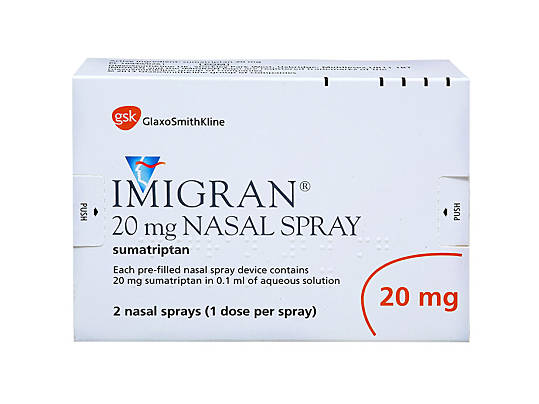Migraine Treatment
Discover a range of treatments for migraines and get free and fast delivery.
Prices from £19.99
Simply fill in a brief consultation questionnaire and one of our doctors will review your request today.
Migraine is a common condition which causes severe headaches. Migraine headaches are often accompanied by other symptoms, for example nausea, sensitivity to light, or vomiting.
Migraines can be treated with over the counter painkillers. If painkillers do not to reduce symptoms enough, you can try treating your migraine with triptans.
We offer the following options to ease migraine symptoms:
- Sumatriptan 50mg and 100mg tablets
- Imigran nasal spray
- Buccastem M, an anti nausea medication
To request one of these medications, complete our short questionnaire about your migraine symptoms and medical history. One of our doctors will review your answers and prescribe treatment, if suitable. Delivery and prescription are included.
Migraine treatments
In stock. Prices from £23.00
In stock. Prices from £31.99
In stock. Prices from £19.99

No results found.
Please check your spelling or try another treatment name.



Get Migraine Treatment
-
-
There are many different ways of treating migraines, from over the counter medications to lifestyle changes. The first line treatment for migraine are non-prescription painkillers. If you find that over the counter painkillers do not help you cope with your symptoms you can try triptans.
Many migraine patients find that certain triggers cause them to suffer migraines. Identifying what causes a migraine in your case and avoiding triggers can help you reduce the frequency with which you experience symptoms.
Instead of using triptans, a more preventative treatment might be right for some people. This would be taken every day, and would try to stop the migraines from happening. This could be right for you if:
- you get migraines more than once a week
- your migraines are so severe that they impact on your life or work, even if you’re using a treatment like Imigran
If this is your experience of migraines, we’d recommend you speak to your GP to see if preventative treatments might be right for you.
-
-
Triptans are a prescription medication for migraines. It’s assumed that migraines are caused by blood vessels in your brain widening to an unusual extent. Triptans are believed to work by narrowing these enlarged blood vessels, thereby reducing the severity and duration of migraine attacks.
You should take a triptan as soon as you can feel a migraine coming on. The sooner you take them, the more effective they can be.
Triptans are not suitable for everyone and you need to get a prescription in order to buy most of them. You can obtain both your prescription and your medication from ZAVA.
-
-
All triptans work best when taken as soon as you notice the first symptoms of a beginning migraine. Take one sumatriptan tablet with a drink of water as soon as you can tell that you’re getting a migraine. Swallow the tablet whole without chewing it.
If you’ve never taken sumatriptan before, start with a 50mg dose. If your symptoms do not improve significantly or if they come back you can check with your doctor whether you can take a higher dose of 100mg instead.
-
-
Imigran nasal spray contains sumatriptan and works in the same way as sumatriptan tablets. The nasal spray is convenient for migraine sufferers who feel nauseous during migraines and who find it difficult to swallow tablets. Just like the tablets, you need to use the nasal spray as soon as you notice the first symptoms.
Each single-use Imigran nasal spray contains one dose – so make sure that you read the instructions on how to use it carefully first.
-
-
As with other triptan tablets, you need to use Maxalt melt oral tablets as soon as you can feel the symptoms of a migraine coming on. You do not need to swallow Maxalt melt tablets. Instead, you need to keep them in your mouth until they have dissolved completely. You do not need to have a drink with Maxalt melt tablets, which makes them a convenient choice for when you’re travelling or on the go.
They’re also useful for migraine sufferers who experience nausea and vomiting during their migraines, as your body absorbs the medicine through the mucus membranes in your mouth. Vomiting will not stop Maxalt melt tablets from working.
You should take one 10mg tablet. If your symptoms do not improve significantly or return within 24 hours you can take a second 10mg tablet. You have to wait at least two hours before taking a second dose.
-
-
Buccastem M tablets are a medication used to treat nausea. If you feel that you can eat, you should take Buccastem M after food.
Take one tablet and put it under your upper lip, as high up as possible between your lip and your gums. Most people find that they cannot feel the tablet after a few minutes and it will dissolve within 1 to 2 hours.
Do not swallow or chew the tablet, as this will make it less effective. You also mustn’t push it around with your tongue.

Dr Kathryn Basford is a qualified GP who works as a GP in London, as well as with ZAVA. She graduated from the University of Manchester and completed her GP training through Whipps Cross Hospital in London.
Meet our doctorsLast reviewed: 19 Jun 2019
-
Sumatriptan 50 mg film‐coated tablets, Patient Information Leaflet, EMC [accessed February 2023]
-
Migraine, National Health Service [accessed February 2023]
-
Migraine Treatment, Triptans, Patient [accessed February 2023]
-
Triptans in the Acute Treatment of Migraine: A Systematic Review and Network Meta-Analysis, Headache [accessed February 2023]
-
IMIGRAN (logo)10 mg and 20 mg NASAL SPRAY, Patient Information Leaflet, EMC [accessed February 2023]








